They fell into the dumpster with a clack and a bang before settling into a silent still life.
Joy. Pure joy.
So reminiscent of House Cleaning, created two years ago in the exact same dumpster at the Lebanon Landfill. While these cleaning supplies weren’t mine, I was just as enthralled with the shapes and textures of this particular pile of scrap metal.
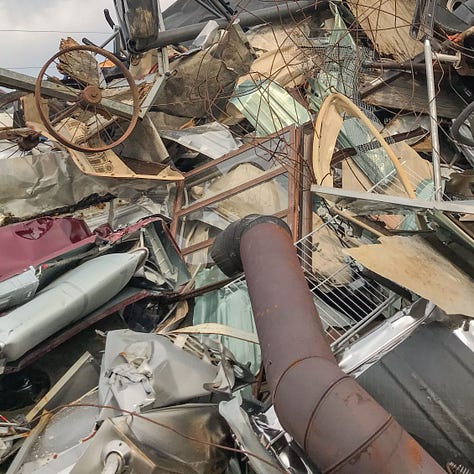
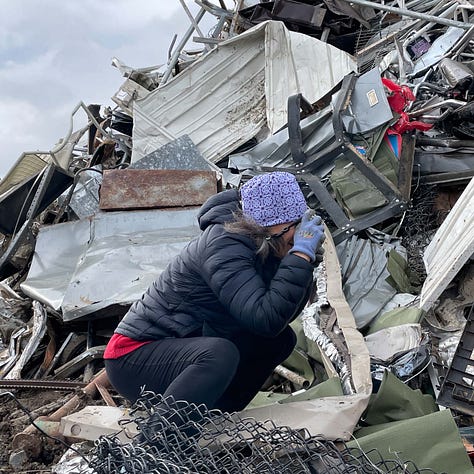
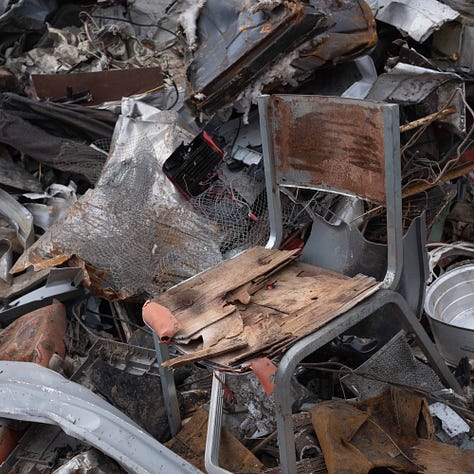
I’ve been documenting this stuff for almost two decades, loving that towns use the revenue generated by the sale of the metal to offset costs of community recycling programs. Meaningful, measurable, and along the way, gloriously textured.
Last Saturday at the scrap metal pile, though, my joy was mixed with grief and shame.
Those metal poles belonged to this Blanchard Draw-Tie Tent, an object I’d salvaged when my parent’s relocated years ago. Made in the 1970’s and used by my father to write a book about my great-grandmother in the 1990’s, it had sat in its bag for decades.
It needed some air and some love. So in 2020 I set it up and tried to patch it where I could.
Along the way, a vision emerged, as they do, of something amazing. Maybe I’d embroider it, as I had done with that Cotillion Dress, or use it as a ‘studio’ for creating still lives.
Or…perhaps it could be a backdrop for self-portraits?
But the tent spent almost a month in our yard and even with all that fresh air and my attempts at mending it, it still smelled like kerosene, was too mildewed for my allergy prone husband and daughter, and really was beyond repair.
It demanded more time than I had, or wanted to make at that moment.
When winter came, I folded it up, returned it to the basement, and wondered when it might be of use. Because…you never know.
And then, last week, we got an unexpected call from someone interested in buying our house. Could they come see it Saturday afternoon?
And that was that. Within 24 hours I was at the landfill saying goodbye to that glorious vintage tent.1
Shame.
Why didn’t I follow through on those groovy ideas? Why hadn’t I found a vintage Blanchard Tent collector who might want it?
Grief.
Because I just had other things on my mind and other projects that were actually more interesting to me. Another idea, scrapped.
Grief.
Because these holiday greeting cards, in the purple bag lying next to the discarded tent canvas (also in a purple bag), were going to be something interesting too, weren’t they?
Let’s see…
‘Joy in a Card: Making Connections, One Card at a Time’ or,
‘Family Tapestry: Images of Joy Disguising Pain’ or….
Why else would I have carefully saved them for decades, organized by family and year?
Grief.
Because I love all those people whose cards we threw away.
Shame.
Why didn’t I sort the cards by those that could and could not be recycled? I used to be so good (and a bit obsessed) at sorting and making sure every object went to the correct location.
Sadly, I remember thinking while sitting on the floor emptying each of those labeled folders: Why bother? 2
Grief. I’m tired. More shame.
Next to those greeting cards and the old tent there’s a bag of styrofoam. I missed two different special collection days. And I used to be the chair of our town’s recycling committee? My have a I fallen! And yet they were cluttering the garage and there’s nothing more pleasing than a clean space for the car.
So those saved holiday cards and that styrofoam also ended up at the landfill in our rapid-fire assessment of what needed to go.
At some point, it’s time to say good-bye, not just to the objects, but to my compulsion to be the perfect climate activist.
Grief. Shame. Exhaustion. Whatever we do will never be enough. When that thought appears, I have to pay attention. It’s dangerous to feel helpless.
More than a decade ago an Ivy League geology professor told me that what wealthy people in New Hampshire do with solar panels and recycling makes no difference in the climate conversation. What matters is what’s happening in China.
The thought that my actions didn’t matter, though, was like telling me my vote didn’t count. And I don’t believe that. Every vote counts. 3
For almost a decade I counted carbon like some people count calories, charting the impact of our solar panels, weatherization efforts and shifts in driving habits until 2018 when I stopped, not from lack of caring, but because we’d plateaued.
We were not even close to the goals I had set for our family, even though we had met what were supposed to be appropriate goals nationally, if everyone else had done the same back in 2010. But they hadn’t. So by 2018 the cuts we needed to make were even greater…4 I remember asking: “Why bother?”
…and thinking: “Damn. Living within the planet’s means is harder when not everyone participates in the game.”
…and wondering: “If all the spreadsheets and technical fixes aren’t enough, what more is being asked of me and of us?”
That’s when I started doing things like composting my diplomas, embroidering old clothes, and taking more photographs of compost - - none of these things were on any list of how to save the planet, but I wondered: might these explorations help me save myself?
You might ask: “Save yourself from what, exactly?”
From all this grief and shame and from being me - - a product of colonial and industrial privilege. Like many others in my class (it has to be named), when growing up I assumed the righteousness of my ancestors. And when confronting the climate crisis in my large house in a ‘suburban’ neighborhood, I assumed the righteousness of my personal climate crusade.
As my recent grief and shame reveal, however, there are limits to my capacity to hold space for all these macro and meta issues while maintaining the dailiness of life.
It is that dailiness that causes such confusion. We think that whether or not we recycle or reuse this or that object really matters, when the core issue is the fact that we own that object in the first place and that we had the money to bring it into our lives.
The real issue in relationship to wealth, China and the climate, is that my house is big, we own three cars (1 for our 20-something children), and we go on family vacations. In the context of those we know, we are relatively modest.
Is that an excuse? No. Just a contextual reference point.
It is so much safer to complain about how much stuff we have and to wonder about how to reduce, reuse and recycle, than it is to ask big questions about global wealth disparities and all that privilege allows.
So when we got that call last week, we were really being invited to share, to let go of all that we have been holding onto, and to bring others into the narrative with us.
Will our moving to a smaller place in a shared association be different? Yes. And as the Hanover Community Yard sale has revealed to me year after year, community is good, sharing is good, and letting go is good.
It’s time for our large family house to have a family in it again.
It would be really fun to be the hero of my own climate story, but I’m not there yet.
I’m still in the thick of figuring out what it takes to re-frame my points of reference and re-imagine myself not just in a different kind of place, but also in a different state of mind, one less driven by ‘doing’ and more focused on ‘being.’
So a few days ago I lay down in the Garden Library and let the sun’s warmth do its thing. There were birds, dump trunks, kids playing back-yard ice hockey and more birds. Even though it was in the 20’s, I felt warmth and was grounded.
Like 13 Tons of Love, I am a work in progress. Each week, new questions present themselves and new layers of understanding evolve…or not.
Why bother?
Because none of us is alone. Eco-grief, Eco-guilt, Solastagia and Environmental Melancholia are all documented states of mind that necessitate attention and care. I believe, though, that the more we share our experiences, the less power these feelings have.5
Why bother?
…Because showing up matters, even when we have to throw away things or ideas or visions of ourselves and…
…Because, it’s all about the joy of figuring out this crazy puzzle we call the climate crisis.
Thank you for being here. I am grateful for your interest and companionship.
With cheers and gratitude for you being you…and for showing up,
Lyn
In January 2024 the Lebanon Solid Waste Facilitated a “Pay as you go” system whereby non-Lebanon residents pay ahead for the purple bags instead of the old punch card system.
Even in this state of mind, I did separate the well-used manilla folders to recycle.
My Harvard classmate, Melissa Lane, wrote a book Eco-Republic, published in 2011. Her rationale for action was clear: “Every single emissions contributes to the composite problem, which is made of trillions of tiny emissions. Thus there is not threshold for making a literal difference to the problem: every single atom of greenhouse gas emissions saved is a literal improvement.”
The mantra in 2010 was 20% reduction by 2020. By 2018, when the newest United Nations Climate Report was released, it was clear that global emissions had been increasing, not going down. So in 2018, the mantra was 30% by 2030. And since emissions continue to rise, it’s now 40% by 2040. It just keeps getting harder. Why didn’t everyone listen to and act upon the horribly inconvenient truths presented between 2000 and 2010? If you’re reading this, you know why.
There are many books and articles about the psychological impact of the climate crisis. Here are two articles that offer some useful introductions: National Library of Medicine article and Journal of Agricultural & Environmental Ethics article.

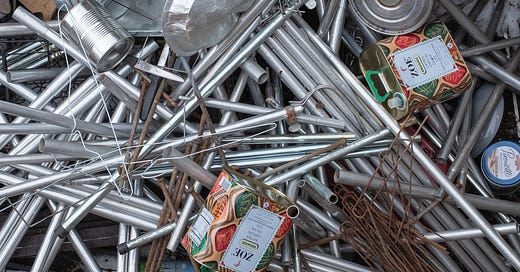



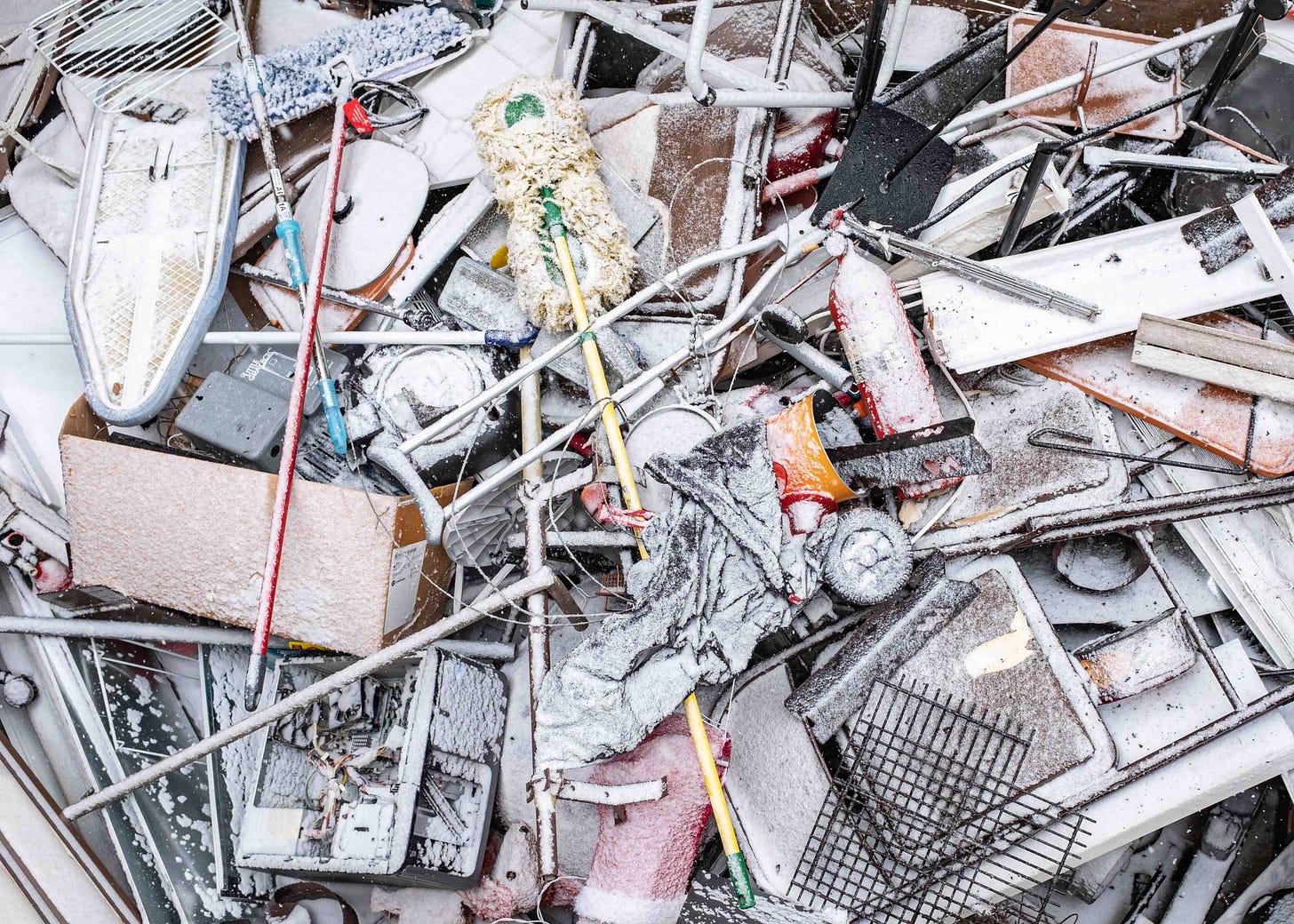


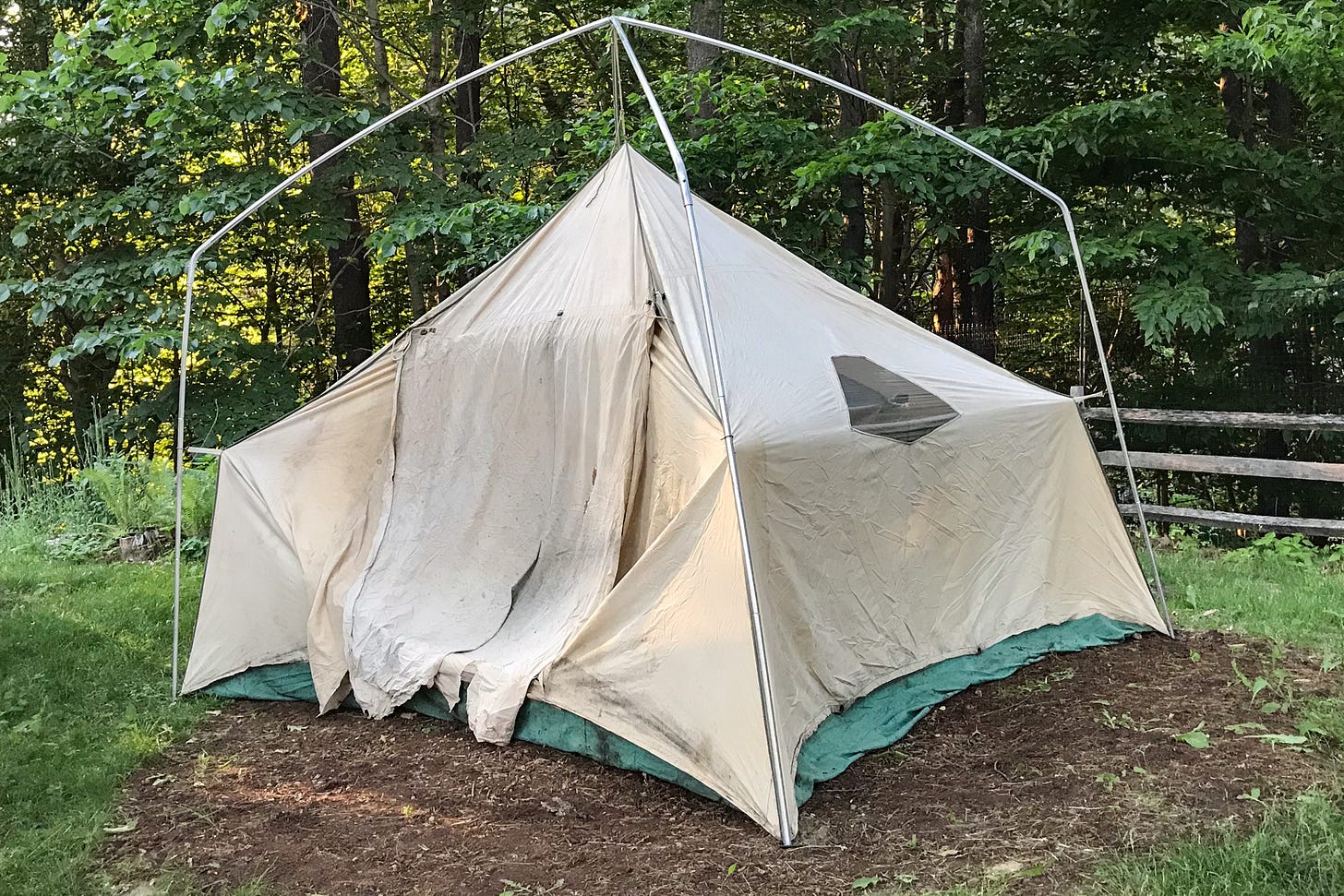

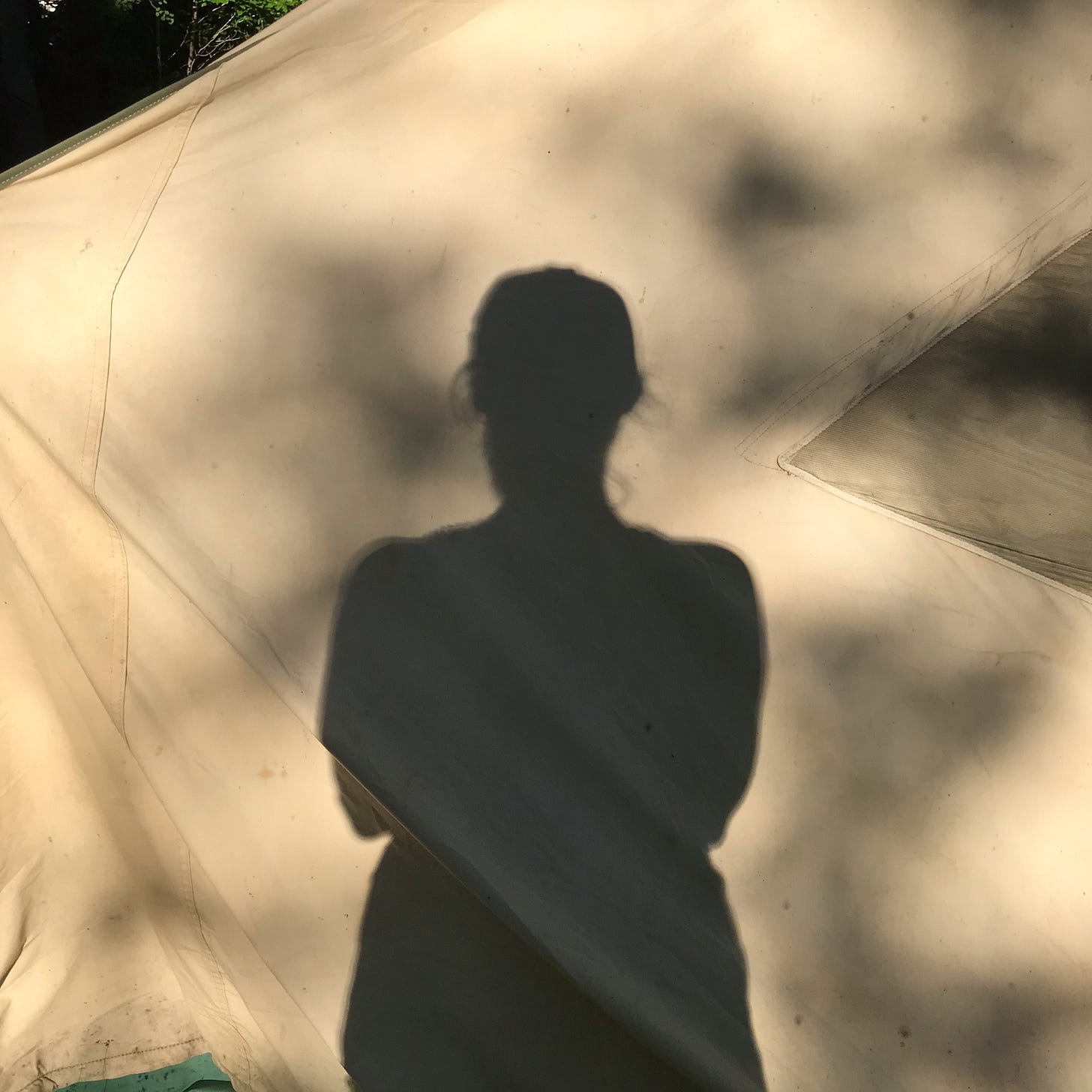



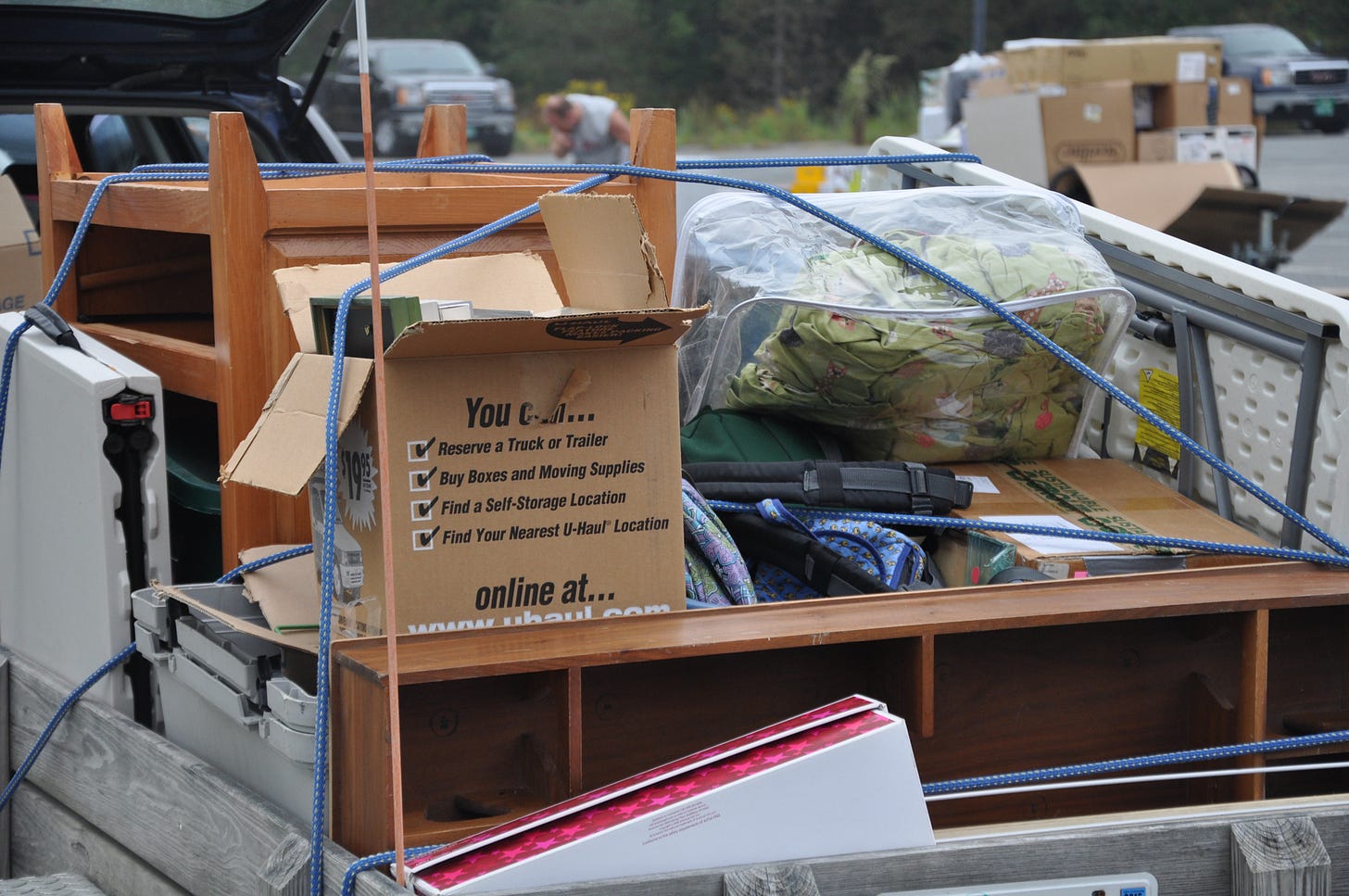
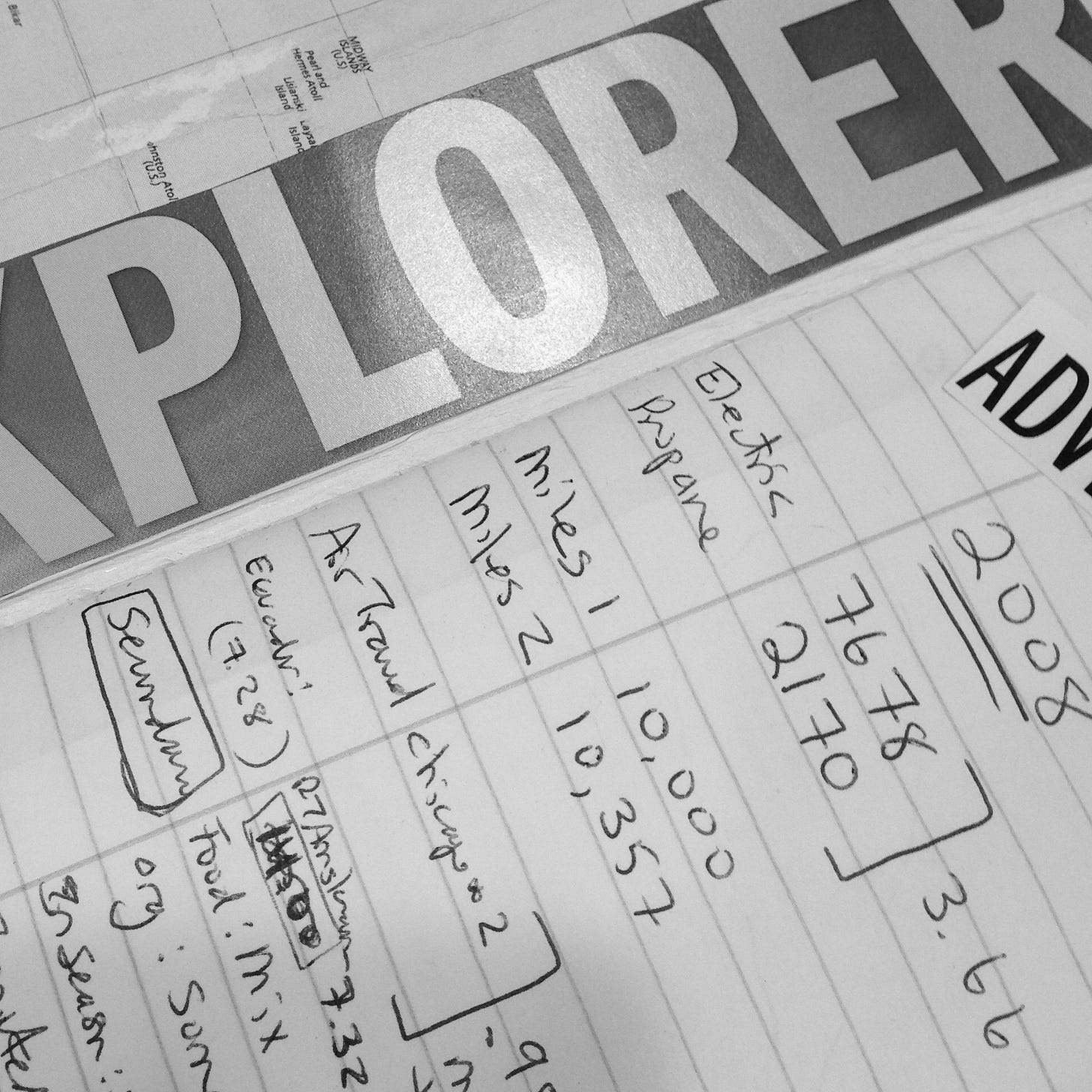
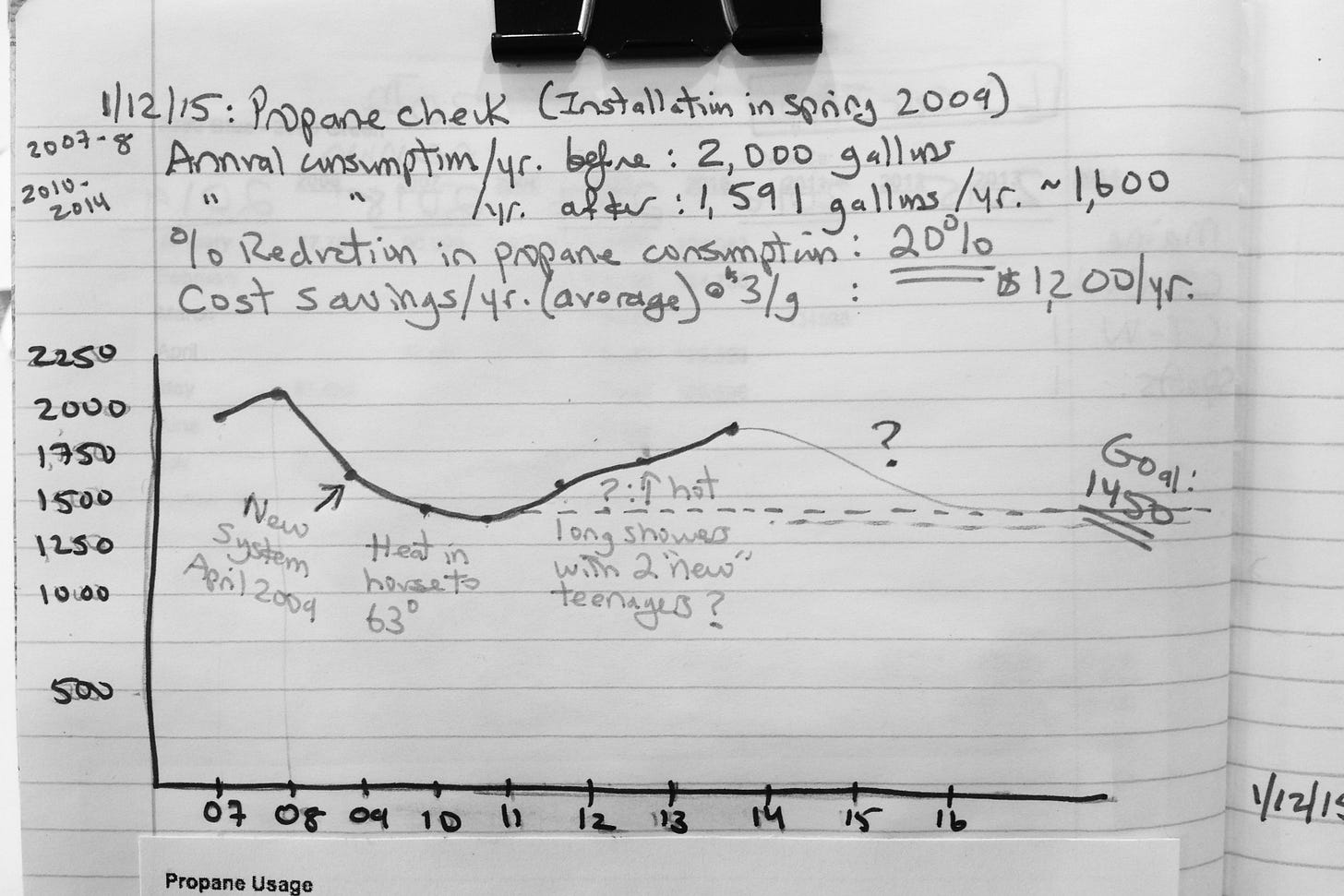
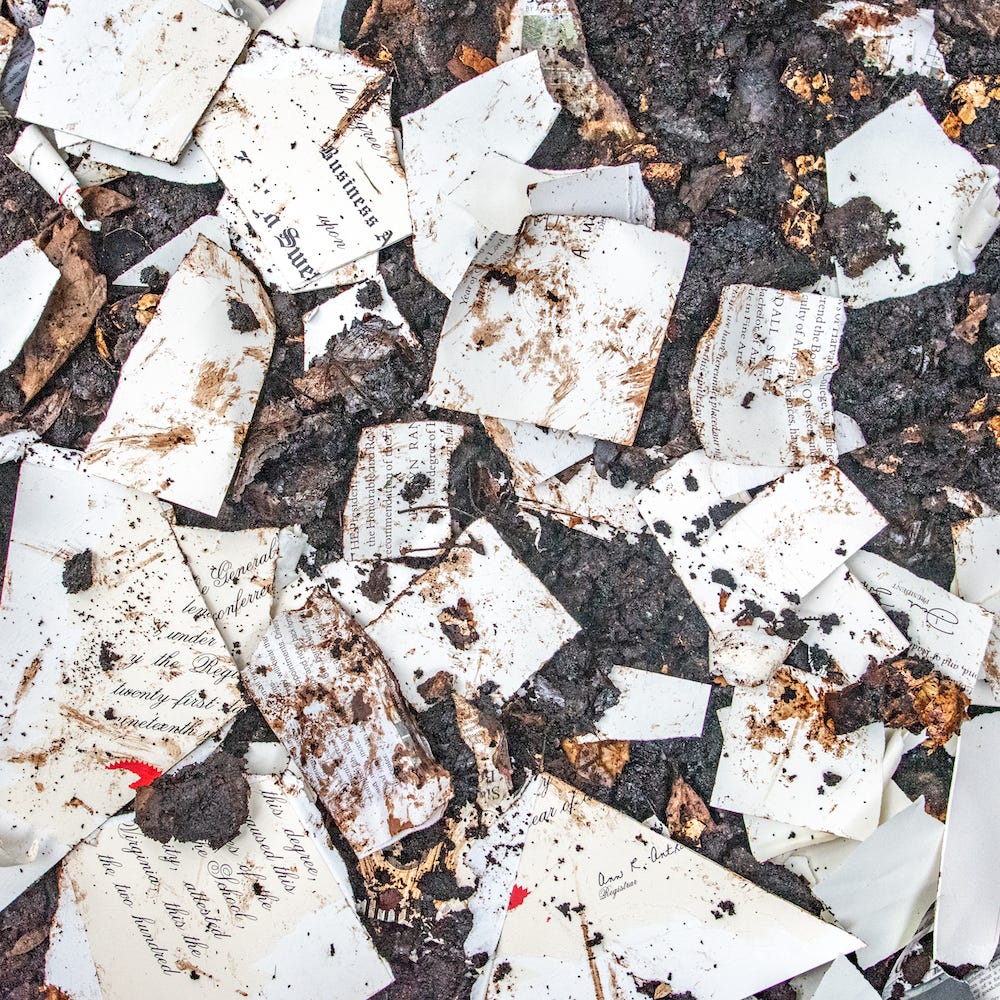



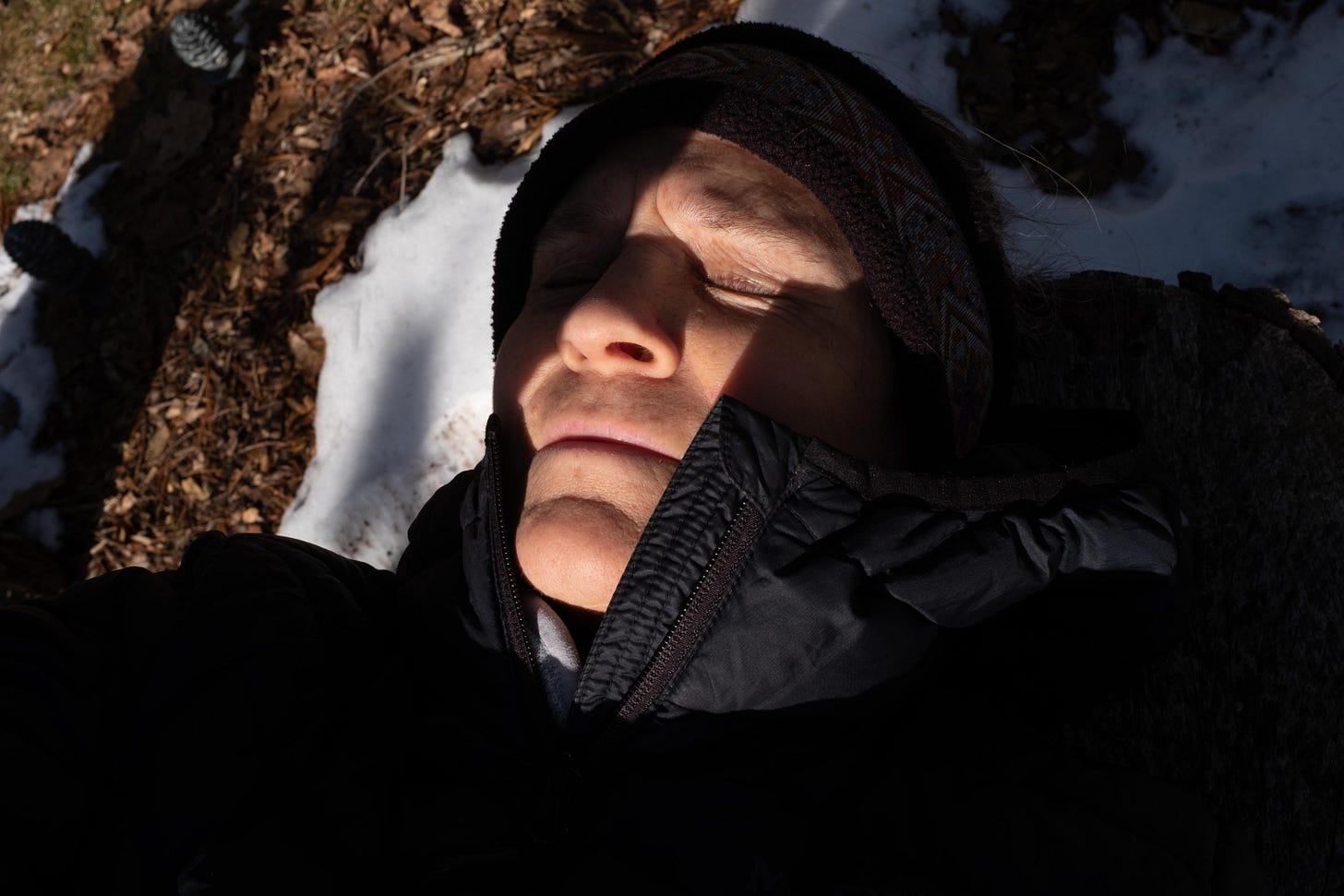

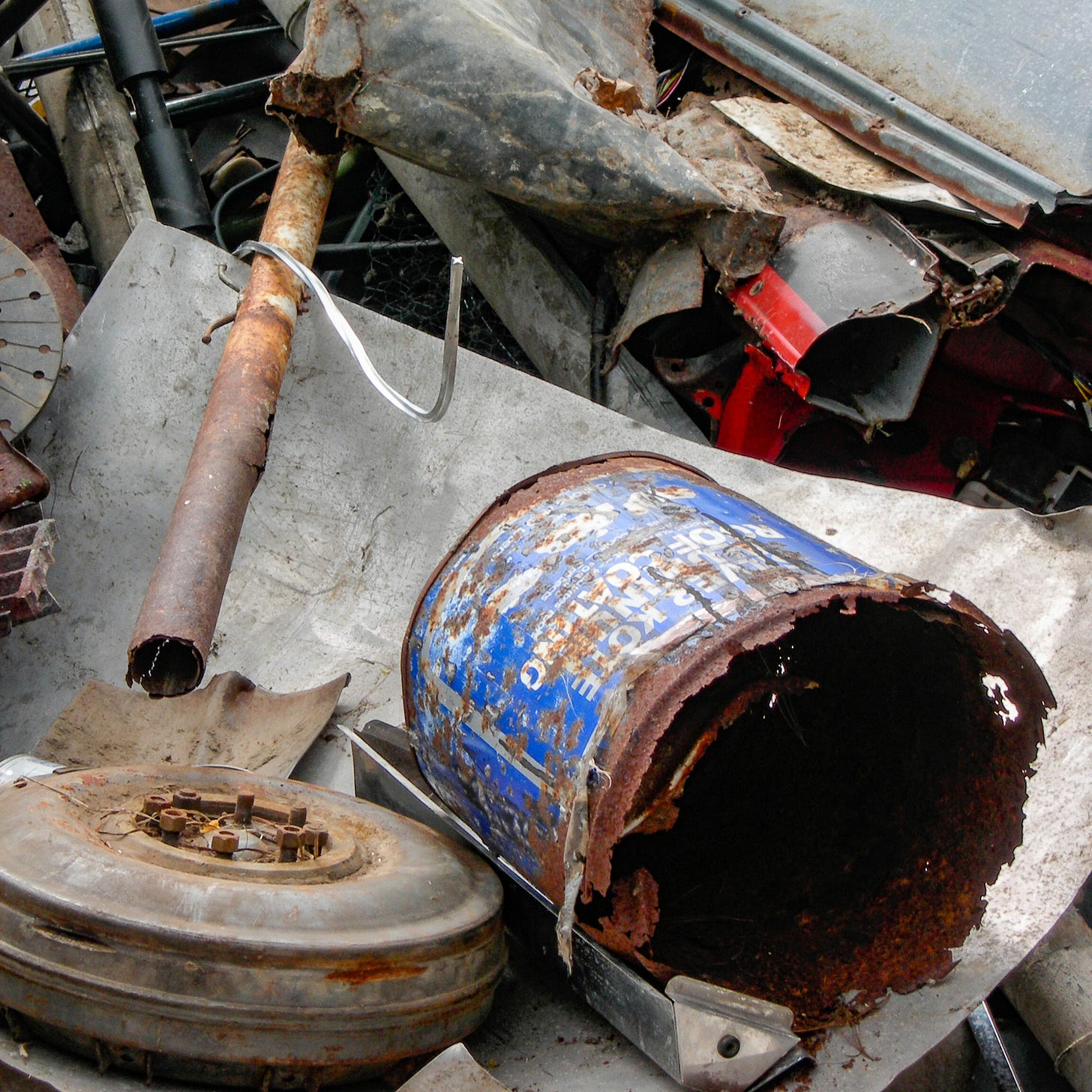
Lyn, thank you so much for sharing so deeply into your feelings, particularly around shame. I also have an ever growing pile of greeting cards, though I have not been dilligent in sorting them and they've ended up in a pile under my guest pillows! There was also a moment when you described laying in the garden that reminded me of Entangled Lives by Merlin Sheldrake (I just finished it last night and immediately thought of your work!). Apparently there are compost saunas where you are covered in composting wood chips! Thank you for sharing your work, I found myself so drawn to the curves of the twisted metal in the 5th image.
Hi, Lynn. I so appreciate the intimacy you're sharing of your feelings, observations, and reflections.